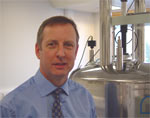25/04/03
25/04/03
Funding boost for cancer research
 Kingston University's Pharmaceutical Science Research Group is stepping up its work developing drugs to counter cancer. The group has been given £200,000 from the Science Research Investment Fund to look more closely at the causes of hormone-dependent forms of the disease, such as prostate and breast cancer.
Kingston University's Pharmaceutical Science Research Group is stepping up its work developing drugs to counter cancer. The group has been given £200,000 from the Science Research Investment Fund to look more closely at the causes of hormone-dependent forms of the disease, such as prostate and breast cancer.
The research is being lead by Dr Sabir Ahmed, who is developing molecules that mimic testosterone but cancel out the function that causes cancer. He is using the University's new nuclear magnetic resonance machine to carry out the detailed analysis required. The state-of-the-art equipment provides intricate information about the structure and shape of molecules and allows researchers to develop new molecules at a faster rate than previous technology.
Professor Keith Jones said the team's work could eventually contribute to possible cures for some cancers. "Various hormones are involved in prostate and breast cancer," he said. "However, if they are able to find a way to block testosterone, for example, this work could lead to new drugs being developed to treat prostate cancer."
Although the University's research could provide a breakthrough in the future, Professor Jones stressed there was still a long way to go to find the ultimate cure for prostate and breast cancers. "Naturally we would love to discover new medicines to treat cancer and parasitic diseases," he said. "But we're also trying to invent new reactions that, in 50 years time, the pharmaceutical industry will use. Essentially we are underpinning research that needs to be taken forward in the future."
The Pharmaceutical Science Research Group is also currently analysing anti-parasitic compounds and has started another project to investigate some of the causes of hypertension.
Bridge - The Kingston University magazine
April 2003